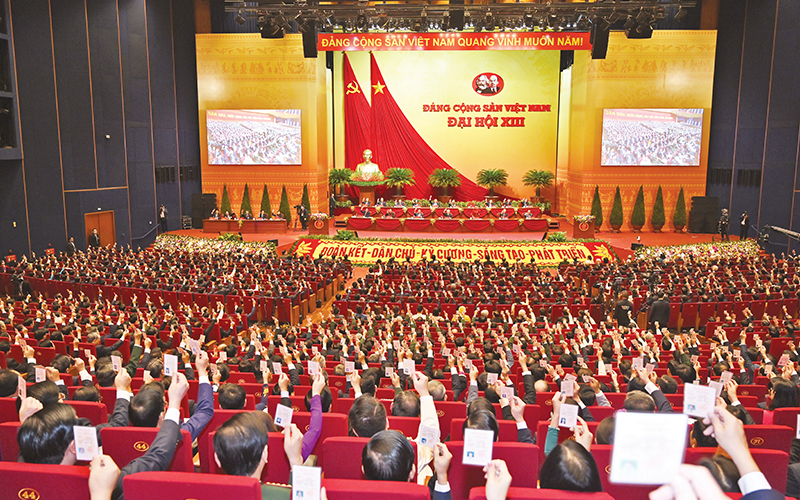Basic contents of the principle of democratic centralism in the Communist Party of Vietnam
What are the basic contents of the principle of democratic centralism in the Communist Party of Vietnam? - Hoang Mai (Tien Giang)

Basic contents of the principle of democratic centralism in the Communist Party of Vietnam (Internet image)
Regarding this issue, LawNet would like to answer as follows:
1. Basic contents of the principle of democratic centralism in the Party
According to Article 9 of the Charter of the Communist Party of Vietnam 2011, the Communist Party of Vietnam is organized on the principle of democratic centralism. The basic content of that principle is:
- The Party's leadership agencies at all levels are established by the election and implemented by collective leadership and individual responsibility.
- The highest governing body of the Party is the National Congress of Deputies. The leading body at each level is a congress of delegates or a congress of party members. Between the two congresses, the leading body of the Party is the Central Executive Committee, and at each level is the executive committee of the Party cell and branch (referred to as the Party Committee).
- Party committees at all levels report and take responsibility for their activities before the congress of the same level, and before the superior and lower level committees; periodically notify their operation status to affiliated party organizations, conduct self-criticism and criticism.
- Party organizations and party members must abide by the Party's resolutions. The minority submits to the majority, subordinates submit to superiors, individuals submit to organizations, and organizations throughout the Party submit to the National Congress and the Central Committee.
- Resolutions of the Party's leading bodies are only valid when more than half of the members in that body approve. Before voting, each member is allowed to express his/her opinion.
Party members whose opinions belong to the minority are entitled to reserve and report to the superior party committee until the National Congress of Deputies, but they must strictly abide by the resolution and not spread opinions contrary to the Party's resolution. The competent authority shall study and consider such an opinion; it does not discriminate against party members with minority opinions.
- Party organizations decide on issues within their jurisdiction, but must not be contrary to the principles, lines, and policies of the Party, laws of the State or the resolutions of superiors.
2. Some regulations on the implementation of the principle of democratic centralism within the Party in Vietnam
Some regulations on the implementation of the principle of democratic centralism in the Party in Vietnam according to Regulation 24-QD/TW in 2021 are as follows:
(1) Regarding the working regulations of the Party committee and organization.
- Pursuant to the Party Charter, regulations of the Politburo and the Secretariat on the functions, tasks, powers, and working relationships of the Party Committees, Party organizations, specialized agencies to advise and assist the Party Committees, and the working regulations of the superior Party Committees, Party committees at all levels, party unions, party personnel committees, and advisory and assisting agencies of the committees must develop working regulations to ensure the principle of democratic centralism and properly perform their assigned responsibilities and powers.
Party organizations are responsible for reporting to superior party organizations and informing immediate subordinate party organizations of their organization's working regulations.
- When deeming it necessary, the superior party committees shall issue regulations on the coordination of activities and work of the party committees at lower levels or party organizations related to many branches and levels.
- The organizational committee of the superior party committee is responsible for guiding the lower level party committee and organization to develop working regulations.
(2) On the implementation of the principle of self-criticism and criticism.
- Annually, the Politburo, the Secretariat, the Standing Committee of the Party Committee at the grassroots level and above, the grassroots level committee, the Party union, the Party personnel committee, the leaders of the departments and branches, unions, members of all levels, and party members must self-criticize and criticize collectives and individuals, review the responsibility of setting an example for cadres and party members; have plans and measures to promote advantages and overcome limitations and shortcomings.
- At the end of the congress, the Central Executive Committee, the Politburo, the Secretariat, the committees, the standing committees at all levels, the inspection committees, the party unions, the party personnel committees, the members at all levels, the members of the Party Committee, the Party cadre committee, and the leaders of the advisory and assisting agencies of the Central Committee and of the Party Committees at all levels must conduct self-criticism and criticism associated with the review and evaluation of the results of the implementation of the resolutions of the Congress.
The review shall comply with the Politburo's regulations and ensure the following requirements:
+ The review report of the party committee must collect opinions from the immediate subordinates, the party union, the party cadre committee, and the leaders of the departments, branches, and mass organizations at the same level, must also have the opinions of the immediate superior committees.
+ The review report of the party union, the party cadre committee, the inspection committee, and the leaders of the committees, branches, and mass organizations must collect opinions from specialized agencies, the agency's party committee, and the party committee at the same level.
+ The superior party committees suggest to the individuals and collectives of the party committees of the immediate subordinate agencies and organizations the contents that need to be clarified when reviewing, self-criticizing, and criticizing:
++ For individual members, members of the standing committee of the Party committee, members of the Party union, the party's civil service committee, and members of the inspection committee must conduct in-depth reviews.
on political responsibility, the level of striving to complete the assigned work, and other issues related to personal responsibility;
Regarding preserving personal qualities (political ideology, morality, lifestyle, observing the principle of democratic centralism, fighting corruption, waste, negativity, and bureaucracy) and implementing the Party's regulations on the responsibility of setting an example for cadres and party members.
++ For collective committees, standing committees of party committees, inspection committees of party committees, party committees, and party civil affairs committees, they must review the observance of resolutions and directives.
regulations, guidelines, and conclusions of the Party and higher level committees; the formulation and organization of the implementation of resolutions, directives, regulations, guidelines, and conclusions of their respective levels;
Regarding the formulation and implementation of working regulations, building internal unity, purity, and strength, financial and budgetary management, land management, and related fields, leadership, direction, and organization of inspection, supervision, party discipline, and settlement of complaints and denunciations.
++ Standing committees at higher levels are responsible for synthesizing, analyzing, and selecting issues to submit to party organizations, and lower-level committees are responsible for suggesting collective and individual self-criticism.
+ Organize the collection of comments from the Fatherland Front, executive committees of socio-political organizations, and People's Councils at the same level, promoting the role of people's supervision and suggestions on Party building.
(3) The regulation "Resolutions of the leading organs of the Party are only valid when more than half of the members of that body approve" is specified as follows:
- Number of members of a congress is the total number of officially convened delegates who are eligible to attend the meeting (except for the number of members at the level of convening the meeting who are absent for the duration of the congress, the official absentee for the duration of the congress does not have an alternate delegate).
- The number of members of a congress of party members or a conference of party members is the total number of official party members in a convened party cell or branch (except for the number of Party members who have been temporarily introduced to other Party committees and Party members who have been exempted from party work and activities who are not present at the congress) (if that party member is present at the congress or conference of party members, participates in elections, and votes, it will still be counted);
The number of party members who are suspended from party activities, prosecuted, detained, or officially absent for the duration of the congress with legitimate reasons shall be approved by the Party committee convening the congress).
- Number of members of the meeting of the Executive Committee of the Party, the Standing Committee of the Party Committee, and the Inspection Committee is the total number of incumbent members of the Executive Committee of the Party Committee, members of the Standing Committee of the Party Committee, and members of the incumbent inspection committee (except for the number of members who have changed party activities and are temporarily absent from the conference, and the number of members who are suspended from activities, prosecuted, or detained).
- Cases of admission of party members, recognition of official party members, deletion of party members' names, and expulsion of party members must be proposed unanimously by at least two-thirds of the members of the party organization and decided by the competent superior committee with the consent of more than half of the members.
- In the case of the dissolution of a party organization, it must be proposed by at least two-thirds of the members of the immediate superior party committee, and the superior level committee at one level shall decide with the consent of more than half of the members.
- Key word:
- democratic centralism
- in Vietnam
- Cases of land rent exemption and reduction under the latest regulations in Vietnam
- Economic infrastructure and social infrastructure system in Thu Duc City, Ho Chi Minh City
- Regulations on ordination with foreign elements in religious organizations in Vietnam
- Increase land compensation prices in Vietnam from January 1, 2026
- Determination of land compensation levels for damage during land requisition process in Vietnam
- Who is permitted to purchase social housing according to latest regulations in Vietnam?
-

- Emergency response and search and rescue organizations ...
- 10:29, 11/09/2024
-

- Handling of the acceptance results of ministerial ...
- 09:30, 11/09/2024
-

- Guidance on unexploded ordnance investigation ...
- 18:30, 09/09/2024
-

- Sources of the National database on construction ...
- 16:37, 09/09/2024
-

- General regulations on the implementation of administrative ...
- 11:30, 09/09/2024
-

- Notable new policies of Vietnam effective as of ...
- 16:26, 11/04/2025
-
.Medium.png)
- Notable documents of Vietnam in the previous week ...
- 16:21, 11/04/2025
-
.Medium.png)
- Notable documents of Vietnam in the previous week ...
- 16:11, 02/04/2025
-
.Medium.png)
- Notable new policies of Vietnam to be effective ...
- 16:04, 02/04/2025
-
.Medium.png)
- Notable new policies of Vietnam effective from ...
- 14:51, 21/03/2025

 Article table of contents
Article table of contents
